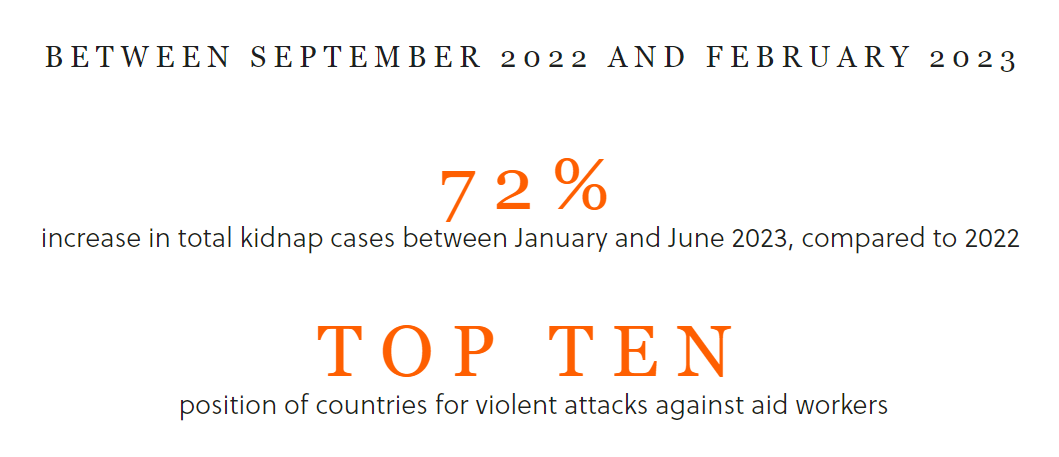Downhill from here? Safety concerns and evacuation challenges grow in Haiti
On 30 August, the US urged its citizens to exit Haiti as soon as possible amid an ongoing deterioration in the security situation. The following day, a small group of people from the US diplomatic mission were reportedly transported to Toussaint Louverture International Airport in the capital, Port-au-Prince, and flown home by a US charter airline. Since former president Jovenel Moïse’s assassination in July 2021, rising lawlessness, and a deepening economic and political crisis, has enabled street gangs to seize control of most of Port-au-Prince, and other cities like Cap-Haitien, Port-De-Paix and Gonaives, resulting in an increasingly hostile operating environment for aid workers, foreign nationals and locals alike.
Haiti is facing a complex series of persistent operational challenges for those on the ground. Below we draw out some of the manifold threats in the country to showcase why a comprehensive resolution is likely to remain a distant prospect.
Aid workers under attack
Ensuing skirmishes and abductions between rival gangs, community militias, and security forces continue to place aid workers and hospitals in particular under frequent and direct threats of violence. Due to their necessary presence in high-risk areas, NGOs like the International Rescue Committee (IRC) and Médecins Sans Frontières (MSF) remain severely exposed to attacks. In July 2023, MSF suspended operations at its Tabarre hospital in Port-au-Prince after gunmen stormed the facility to kidnap a suspected gang member in one of the clinic’s operating rooms. In January, the organisation suspended assistance to a hospital in Carrefour, while in June 2021, its emergency clinic in the Martissant neighbourhood permanently closed as fighting between gangs intensified. In August, pop-up clinics and local aid groups backed by the IRC also closed operations due to hostile conditions.
Insecurity drives kidnap threat for foreign nationals
Opportunities for obtaining high ransoms have encouraged kidnappers to target foreign nationals. For example, in July 2023, armed men kidnapped a US nurse and her daughter from her aid organisation’s Port-au-Prince compound and demanded a USD one million ransom. The nurse and her daughter were released under unspecified circumstances. In another incident in March 2023, gunmen targeted a bus to kidnap a US couple after spotting their luggage on board. The couple was released in April following the payment of a USD 400,000 ransom.

Challenges to peace
Some local non-profits like the Centre d'analyse et de recherche en droits de l'homme (CARDH) claim that lynchings and burnings of suspected gang members by growing vigilante militias has impacted gang numbers and gang-controlled territory. But, considering the precedent for self-defence militias to perpetuate the violence they seek to counter, as in Mexico and Brazil, there is the potential for growing vigilante justice to stoke conflict with gangs, exacerbating existing violence and social tensions.
In this context, the international community, led by the US and most recently Kenya, have deliberated on sending a multinational force to aid the government in addressing insecurity. However, considering the unrest that occurred when the idea of a US-led military support force was first floated in 2022, there is significant potential that a misstep in the course of such a move will stoke further anti-US sentiment, rendering the operating environment even more hostile to aid workers in the longer term. Past peacekeeping and humanitarian missions to Haiti, for example in the aftermath of the deadly earthquake in 2010, have been subject to some scrutiny, with both aid workers and peacekeepers accused of abuses during deployments.
Evacuation challenges
For those not part of diplomatic missions, governmental assistance is not guaranteed, and sheltering in place for prolonged periods can become unfeasible as supplies dwindle, or if there is an urgent need for medical attention.
But evacuating independently can be equally challenging; US authorities have cautioned that violence is exacerbating existing infrastructural weaknesses, including damage from the 2021 earthquake. Fighting has hampered movement within the capital, and with commercial flights quickly filling up, significant delays to air travel are expected in the coming weeks and months. Unrest and violence also regularly disrupts airport access.
In more remote areas of the country, transportation is limited due to poor infrastructure, while road travel to the capital remains unsafe. In the unrest following the 2021 earthquake, for example, gangs and desperate communities attacked and looted aid convoys transporting supplies.
